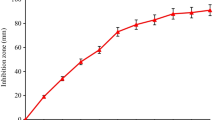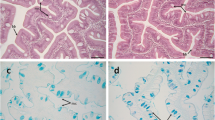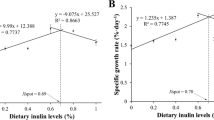Abstract
Microalgae are known to be abundant in various habitats around the globe, and are rich in high value-added products such as fatty acids, polysaccharides, proteins, and pigments. Microalgae can be exploited as the basic and primitive food source of aquatic animals. We investigated the effects of dietary supplementation with Schizochytrium sp., Spirulina platensis, Chloroella sorokiniana, Chromochloris zofingiensis, and Dunaliella salina on the growth performance, immune status, and intestinal health of zebrafish (Danio rerio). The results showed that these five microalgae diets could improve the feed conversion rate (FCR), especially the D. salina (FCR = 1.02%) and Schizochytrium sp. (FCR = 1.20%) additive groups. Moreover, the microalgae diets decreased the gene expression level of the pro-inflammatory cytokines IL6, IL8, and IL1β at a normal physiological state of the intestine, especially the Schizochytrium sp., S. platensis, and D. salina dietary groups. The expression of neutrophil marker b7r was increased in the C. sorokiniana diet group; after, the zebrafish were challenged with Vibrio anguillarum, improving the ability to resist this disease. We also found that microalgae diets could regulate the gut microbiota of fish as well as increase the relative abundance of probiotics. To further explain, Cetobacterium was significantly enriched in the S. platensis additive group and Stenotrophomonas was higher in the Schizochytrium sp. additive group than in the other groups. Conversely, harmful bacteria Mycoplasma reduced in all tested microalgae diet groups. Our study indicated that these microalgae could serve as a food source supplement and benefit the health of fish.
Key points
• Microalgae diets enhanced the growth performance of zebrafish.
• Microalgae diets attenuated the intestinal inflammatory responses of zebrafish.
• Microalgae diets modulated the gut microbiota composition to improve fish health.




Similar content being viewed by others
Data availability
The datasets supporting the conclusions of this article are included within the article and its supplementary materials. The sequencing raw data was deposited in the NCBI Sequence Read Archive database (accession: PRJNA759359).
References
Ávila-Román J, Talero E, de los Reyes C, García-Mauriño S, Motilva V (2018) Microalgae-derived oxylipins decrease inflammatory mediators by regulating the subcellular location of NFκB and PPAR-γ. Pharm Res 128:220-230. https://doi.org/10.1016/j.phrs.2017.10.009
Bates JM, Mittge E, Kuhlman J, Baden KN, Cheesman SE, Guillemin K (2006) Distinct signals from the microbiota promote different aspects of zebrafish gut differentiation. Dev Biol 297(2):374–386. https://doi.org/10.1016/j.ydbio.2006.05.006
Bito T, Okumura E, Fujishima M, Watanabe F (2020) Potential of Chlorella as a dietary supplement to promote human health. Nutrients 12(9):2524. https://doi.org/10.3390/nu12092524
Bravo-Tello K, Ehrenfeld N, Solis CJ, Ulloa PE, Hedrera M, Pizarro-Guajardo M, Paredes-Sabja D, Feijoo CG (2017) Effect of microalgae on intestinal inflammation triggered by soybean meal and bacterial infection in zebrafish. PLoS ONE 12(11):e0187696. https://doi.org/10.1371/journal.pone.0187696
Brestoff JR, Artis D (2013) Commensal bacteria at the interface of host metabolism and the immune system. Nat Immunol 14(7):676–684. https://doi.org/10.1038/ni.2640
Burns AR, Watral V, Sichel S, Spagnoli S, Banse AV, Mittge E, Sharpton TJ, Guillemin K, Kent ML (2018) Transmission of a common intestinal neoplasm in zebrafish by cohabitation. J Fish Dis 41(4):569–579. https://doi.org/10.1111/jfd.12743
Camara-Ruiz M, Balebona MC, Morinigo MA, Esteban MA (2020) Probiotic Shewanella putrefaciens (SpPdp11) as a fish health modulator: a review. Microorganisms 8(12):1990. https://doi.org/10.3390/microorganisms8121990
Cerezuela R, Meseguer J, Esteban MÁ (2013) Effects of dietary inulin, Bacillus subtilis and microalgae on intestinal gene expression in gilthead seabream (Sparus aurata L.). Fish Shellfish Immun 34(3):843–848. https://doi.org/10.1016/j.fsi.2012.12.026
Cerezuela R, Fumanal M, Tapia-Paniagua ST, Meseguer J, Moriñigo MÁ, Esteban MÁ (2012) Histological alterations and microbial ecology of the intestine in gilthead seabream (Sparus aurata L.) fed dietary probiotics and microalgae. Cell Tissue Res 350(3):477–489. https://doi.org/10.1007/s00441-012-1495-4
Chao A (1984) Nonparametric estimation of the number of classes in a population. Scand J Stat 11(4):265–270. https://doi.org/10.2307/4615964
Chao A, Lee S (1992) Estimating the number of classes via sample coverage. J Am Stat Assoc 87(417):210–217. https://doi.org/10.1080/01621459.1992.10475194
Charoonnart P, Purton S, Saksmerprome V (2018) Applications of microalgal biotechnology for disease control in aquaculture. Biology (basel) 7(2):24. https://doi.org/10.3390/biology7020024
Christaki E, Bonos E, Giannenas I, Florou-Paneri P (2013) Functional properties of carotenoids originating from algae. J Sci Food Agr 93(1):5–11. https://doi.org/10.1002/jsfa.5902
Clements KD, Angert ER, Montgomery WL, Choat JH (2014) Intestinal microbiota in fishes: what’s known and what’s not. Mol Ecol 23(8):1891–1898. https://doi.org/10.1111/mec.12699
Cordero H, Guardiola FA, Tapia-Paniagua ST, Cuesta A, Meseguer J, Balebona MC, Morinigo MA, Esteban MA (2015) Modulation of immunity and gut microbiota after dietary administration of alginate encapsulated Shewanella putrefaciens Pdp11 to gilthead seabream (Sparus aurata L.). Fish Shellfish Immun 45(2):608–618. https://doi.org/10.1016/j.fsi.2015.05.010
Davis JJ, Xia F, Overbeek RA, Olsen GJ (2013) Genomes of the class Erysipelotrichia clarify the firmicute origin of the class Mollicutes. Int J Syst Evol Micr 63(Pt7):2727–2741. https://doi.org/10.1099/ijs.0.048983-0
Desbois AP, Lawlor KC (2013) Antibacterial activity of long-lhain polyunsaturated fatty acids against Propionibacterium acnes and Staphylococcus aureus. Mar Drugs 11(11):4544–4557. https://doi.org/10.3390/md11114544
Dhandayuthapani K, Malathy S, Mulla SI, Gupta SK (2021) An insight into the potential application of microalgae in pharmaceutical and nutraceutical production. In: Mandotra SK, Upadhyay AK, Ahluwalia AS (eds) Algae: multifarious applications for a sustainable world. Springer Singapore, Singapore, pp 135–179
Dubois M, Gilles KA, Hamilton JK, Pt R, Smith F (1956) Colorimetric method for determination of sugars and related substances. Anal Chem 28:350–356. https://doi.org/10.1021/ac60111a017
Fajardo C, Donato M, Carrasco R, MartínezRodríguez G, Mancera JM, Fernández-Acero FJ (2019) Advances and challenges in genetic engineering of microalgae. Rev Aquacult 12:365–381. https://doi.org/10.1111/raq.12322
Ferrazzano GF, Papa C, Pollio A, Ingenito A, Sangianantoni G, Cantile T (2020) Cyanobacteria and microalgae as sources of functional foods to improve human general and oral health. Molecules 25(21):5164. https://doi.org/10.3390/molecules25215164
Folch J, Lees M, Stanley GHS (1957) A simple method for the isolation and purification of total lipides from animal tissues. J Biol Chem 226(1):497–509. https://doi.org/10.1016/S0021-9258(18)64849-5
Furbeyre H, van Milgen J, Mener T, Gloaguen M, Labussière E (2017) Effects of dietary supplementation with freshwater microalgae on growth performance, nutrient digestibility and gut health in weaned piglets. Animal 11(2):183–192. https://doi.org/10.1017/S1751731116001543
Furbeyre H, van Milgen J, Mener T, Gloaguen M, Labussière E (2018) Effects of oral supplementation with Spirulina and Chlorella on growth and digestive health in piglets around weaning. Animal 12(11):2264–2273. https://doi.org/10.1017/S1751731118000125
Galindo-Villegas J (2016) Recent findings on vertebrate developmental immunity using the zebrafish model. Mol Immunol 69:106–112. https://doi.org/10.1016/j.molimm.2015.10.011
Gómez GD, Balcázar JL (2008) A review on the interactions between gut microbiota and innate immunity of fish. Fems Immunol Med Mic 52(2):145–154. https://doi.org/10.1111/j.1574-695X.2007.00343.x
Gutiérrez S, Svahn SL, Johansson ME (2019) Effects of omega-3 fatty acids on immune cells. Int J Mol Sci 20(20):5028. https://doi.org/10.3390/ijms20205028
Halpern M, Izhaki I (2017) Fish as hosts of Vibrio cholerae. Front Microbiol 8:282. https://doi.org/10.3389/fmicb.2017.00282
Hao K, Wu ZQ, Li DL, Yu XB, Wang GX, Ling F (2017) Effects of dietary administration of Shewanella xiamenensis A-1, Aeromonas veronii A-7, and Bacillus subtilis, single or combined, on the grass carp (Ctenopharyngodon idella) intestinal microbiota. Probiotics Antimicro 9(4):386–396. https://doi.org/10.1007/s12602-017-9269-7
Hill MO (1973) Diversity and evenness: a unifying notation and its consequences. Ecology 54(2):427–432. https://doi.org/10.2307/1934352
Huyben D, Roehe BK, Bekaert M, Ruyter B, Glencross B (2020) Dietary lipid: protein ratio and n-3 long-chain polyunsaturated fatty acids alters the gut microbiome of atlantic salmon under hypoxic and normoxic conditions. Front Microbiol 11:589898. https://doi.org/10.3389/fmicb.2020.589898
Ina-Salwany MY, Al-Saari N, Mohamad A, Mursidi FA, Mohd-Aris A, Amal MNA, Kasai H, Mino S, Sawabe T, Zamri-Saad M (2019) Vibriosis in fish: a review on disease development and prevention. J Aquat Anim Health 31(2):3–22. https://doi.org/10.1002/aah.10045
Izsák J, Papp L (2000) A link between ecological diversity indices and measures of biodiversity. Ecol Model 130(1):151–156. https://doi.org/10.1016/S0304-3800(00)00203-9
Jung-Schroers V, Jung A, Ryll M, Bauer J, Teitge F, Steinhagen D (2018) Methods for identification and differentiation of different Shewanella spp. isolates for diagnostic use. J Fish Dis 41(4):689–714. https://doi.org/10.1111/jfd.12772
Kelly C, Salinas I (2017) Under pressure: interactions between commensal microbiota and the teleost immune system. Front Immunol 8:559. https://doi.org/10.3389/fimmu.2017.00559
Kent ML, Wall ES, Sichel S, Watral V, Stagaman K, Sharpton TJ, Guillemin K (2021) Pseudocapillaria tomentosa, Mycoplasma spp., and intestinal lesions in experimentally infected zebrafish Danio rerio. Zebrafish 18(3):207–220. https://doi.org/10.1089/zeb.2020.1955
Kong Y, Li M, Guo G, E., Yu L, Sun L, Yin Z, Li R, Chen X, Wang G, (2021) Effects of dietary curcumin inhibit deltamethrin-induced oxidative stress, inflammation and cell apoptosis in Channa argus via Nrf2 and NF-κB signaling pathways. Aquaculture 540:736744. https://doi.org/10.1016/j.aquaculture.2021.736744
Lazado CC, Caipang CMA (2014) Mucosal immunity and probiotics in fish. Fish Shellfish Immun 39(1):78–89. https://doi.org/10.1016/j.fsi.2014.04.015
Lazado CC, Nayak S, Khozin-Goldberg I, Zilberg D (2019) The gut mucosal barrier of zebrafish (Danio rerio) responds to the time-restricted delivery of Lobosphaera incisa-enriched diets. Fish Shellfish Immun 89:368–377. https://doi.org/10.1016/j.fsi.2019.04.012
Li X, Yu Y, Feng W, Yan Q, Gong Y (2012) Host species as a strong determinant of the intestinal microbiota of fish larvae. J Microbiol 50(1):29–37. https://doi.org/10.1007/s12275-012-1340-1
Lichtenthaler HK, Buschmann C (2001) Chlorophylls and carotenoids: measurement and characterization by UV-Vis spectroscopy. Curr Protoc 1:F4.3.1-F4.3.8. https://doi.org/10.1002/0471142913.faf0403s01
Liu X, Wu H, Chang X, Tang Y, Liu Q, Zhang Y (2014) Notable mucosal immune responses induced in the intestine of zebrafish (Danio rerio) bath-vaccinated with a live attenuated Vibrio anguillarum vaccine. Fish Shellfish Immun 40(1):99–108. https://doi.org/10.1016/j.fsi.2014.06.030
Livak KJ, Schmittgen TD (2001) Analysis of relative gene expression data using real-time quantitative PCR and the 2−ΔΔCT method. Methods 25(4):402–408. https://doi.org/10.1006/meth.2001.1262
López Nadal A, Ikeda-Ohtsubo W, Sipkema D, Peggs D, McGurk C, Forlenza M, Wiegertjes GF, Brugman S (2020) Feed, microbiota, and gut immunity: using the zebrafish model to understand fish health. Front Immunol 11:114. https://doi.org/10.3389/fimmu.2020.00114
Ma K, Bao Q, Wu Y, Chen S, Zhao S, Wu H, Fan J (2020) Evaluation of microalgae as immunostimulants and recombinant vaccines for diseases prevention and control in aquaculture. Front Bioeng Biotech 8:590431. https://doi.org/10.3389/fbioe.2020.590431
Martin SAM, Krol E (2017) Nutrigenomics and immune function in fish: new insights from omics technologies. Dev Comp Immunol 75:86–98. https://doi.org/10.1016/j.dci.2017.02.024
Mendivil CO (2021) Dietary fish, fish nutrients, and immune function: a review. Front Nutr 7:617652. https://doi.org/10.3389/fnut.2020.617652
Nagatake T, Kunisawa J (2019) Emerging roles of metabolites of omega3 and omega6 essential fatty acids in the control of intestinal inflammation. Int Immunol 31(9):569–577. https://doi.org/10.1093/intimm/dxy086
Nayak S, Khozin-Goldberg I, Cohen G, Zilberg D (2018) Dietary supplementation with ω6 LC-PUFA-rich algae modulates zebrafish immune function and improves resistance to streptococcal infection. Front Immunol 9:1960. https://doi.org/10.3389/fimmu.2018.01960
Nayak S, Al Ashhab A, Zilberg D, Khozin-Goldberg I (2020) Dietary supplementation with omega-6 LC-PUFA-rich microalgae regulates mucosal immune response and promotes microbial diversity in the zebrafish gut. Biology (basel) 9(6):119. https://doi.org/10.3390/biology9060119
Nielsen SS (2017) Protein nitrogen determination. In: Nielsen SS (ed) Food analysis laboratory manual, 3rd edn. Springer, Cham, pp 131–135
Niu S, Yang L, Zuo H, Zheng J, Weng S, He J, Xu X (2018) A chitinase from pacific white shrimp Litopenaeus vannamei involved in immune regulation. Dev Comp Immunol 85:161–169. https://doi.org/10.1016/j.dci.2018.04.013
Oehlers SHB, Flores MV, Hall CJ, O’Toole R, Swift S, Crosier KE, Crosier PS (2010) Expression of zebrafish cxcl8 (interleukin-8) and its receptors during development and in response to immune stimulation. Dev Comp Immunol 34(3):352–359. https://doi.org/10.1016/j.dci.2009.11.007
Pan C-Y, Liu Y-H, Gong H-Y, Chen J-Y (2017) Transcriptome analysis of the effect of polyunsaturated fatty acids against Vibrio vulnificus infection in Oreochromis niloticus. Fish Shellfish Immun 62:153–163. https://doi.org/10.1016/j.fsi.2017.01.018
Pazdzior E, Pekala-Safinska A, Wasyl D (2019) Genotypic diversity among Shewanella spp. collected from freshwater fish. J Fish Dis 42(5):677–684. https://doi.org/10.1111/jfd.12971
Pérez T, Balcázar JL, Ruiz-Zarzuela I, Halaihel N, Vendrell D, de Blas I, Múzquiz JL (2010) Host–microbiota interactions within the fish intestinal ecosystem. Mucosal Immunol 3(4):355–360. https://doi.org/10.1038/mi.2010.12
Ramirez C, Coronado J, Silva A, Romero J (2018) Cetobacterium is a major component of the microbiome of giant amazonian fish (Arapaima gigas) in Ecuador. Animals (basel) 8(11):189. https://doi.org/10.3390/ani8110189
Rauta PR, Samanta M, Dash HR, Nayak B, Das S (2014) Toll-like receptors (TLRs) in aquatic animals: signaling pathways, expressions and immune responses. Immunol Lett 158(1–2):14–24. https://doi.org/10.1016/j.imlet.2013.11.013
Reyes-Becerril M, Guardiola F, Rojas M, Ascencio-Valle F, Esteban MÁ (2013) Dietary administration of microalgae Navicula sp. affects immune status and gene expression of gilthead seabream (Sparus aurata). Fish Shellfish Immun 35(3):883–889. https://doi.org/10.1016/j.fsi.2013.06.026
Rimoldi S, Gini E, Iannini F, Gasco L, Terova G (2019) The effects of dietary insect meal from Hermetia illucens prepupae on autochthonous gut microbiota of rainbow trout (Oncorhynchus mykiss). Animals (basel) 9(4):143. https://doi.org/10.3390/ani9040143
Rognes T, Flouri T, Nichols B, Quince C, Mahe F (2016) VSEARCH: a versatile open source tool for metagenomics. PeerJ 4:e2584. https://doi.org/10.7717/peerj.2584
Rosales C (2020) Neutrophils at the crossroads of innate and adaptive immunity. J Leukocyte Biol 108(1):377–396. https://doi.org/10.1002/jlb.4mir0220-574rr
Saika A, Nagatake T, Kunisawa J (2019) Host- and microbe-dependent dietary lipid metabolism in the control of allergy, inflammation, and immunity. Front Nutr 6:36. https://doi.org/10.3389/fnut.2019.00036
Salinas I, Parra D (2015) Fish mucosal immunity: intestine. In: Beck BH, Peatman E (eds) Mucosal health in aquaculture. Academic Press, San Diego, pp 135–170
Shah MR, Lutzu GA, Alam A, Sarker P, Kabir Chowdhury MA, Parsaeimehr A, Liang Y, Daroch M (2018) Microalgae in aquafeeds for a sustainable aquaculture industry. J Appl Phycol 30:197–213. https://doi.org/10.1007/s10811-017-1234-z
Shi Y, Cao X, Ye Z, Xu Y, Wang Y, Li Z, Hang W, He N (2021) Role of dietary Schizochytrium sp. in improving disease resistance of zebrafish through metabolic and microbial analysis. Aquaculture 539:736631. https://doi.org/10.1016/j.aquaculture.2021.736631
Sprague M, Walton J, Campbell PJ, Strachan F, Dick JR, Bell JG (2015) Replacement of fish oil with a DHA-rich algal meal derived from Schizochytrium sp. on the fatty acid and persistent organic pollutant levels in diets and flesh of Atlantic salmon (Salmo salar, L.) post-smolts. Food Chem 185:413–421. https://doi.org/10.1016/j.foodchem.2015.03.150
Sugita H, Miyajima C, Deguchi Y (1991) The vitamin B12-producing ability of the intestinal microflora of freshwater fish. Aquaculture 92:267–276. https://doi.org/10.1016/0044-8486(91)90028-6
Tabarzad M, Atabaki V, Hosseinabadi T (2020) Anti-inflammatory activity of bioactive compounds from microalgae and cyanobacteria by focusing on the mechanisms of action. Mol Biol Rep 47(8):6193–6205. https://doi.org/10.1007/s11033-020-05562-9
Talero E, García-Mauriño S, Ávila-Román J, Rodríguez-Luna A, Alcaide A, Motilva V (2015) Bioactive compounds isolated from microalgae in chronic inflammation and cancer. Mar Drugs 13(10):6152–6209. https://doi.org/10.3390/md13106152
Tsuchiya C, Sakata T, Sugita H (2008) Novel ecological niche of Cetobacterium somerae, an anaerobic bacterium in the intestinal tracts of freshwater fish. Lett Appl Microbiol 46(1):43–48. https://doi.org/10.1111/j.1472-765X.2007.02258.x
Volff JN (2005) Genome evolution and biodiversity in teleost fish. Heredity 94(3):280–294. https://doi.org/10.1038/sj.hdy.6800635
Wang Q, Garrity GM, Tiedje JM, Cole JR (2007) Naive Bayesian classifier for rapid assignment of rRNA sequences into the new bacterial taxonomy. Appl Environ Microbiol 73(16):5261–5267. https://doi.org/10.1128/aem.00062-07
Wei C, Wang X, Li C, Zhou H, Liu C, Mai K, He G (2021) Effects of dietary Shewanella sp. MR-7 on the growth performance, immunity, and intestinal microbiota of Pacific white shrimp. Aquacult Rep 19:100595. https://doi.org/10.1016/j.aqrep.2021.100595
Wittamer V, Bertrand JY, Gutschow PW, Traver D (2011) Characterization of the mononuclear phagocyte system in zebrafish. Blood 117(26):7126–7135. https://doi.org/10.1182/blood-2010-11-321448
Xiao Y, Liu Q, Chen H, Zhang Y (2011) A stable plasmid system for heterologous antigen expression in attenuated Vibrio anguillarum. Vaccine 29(40):6986–6993. https://doi.org/10.1016/j.vaccine.2011.07.036
Xin GY, Li WG, Suman TY, Jia PP, Ma YB, Pei DS (2020) Gut bacteria Vibrio sp. and Aeromonas sp. trigger the expression levels of proinflammatory cytokine: first evidence from the germ-free zebrafish. Fish Shellfish Immun 106:518–525. https://doi.org/10.1016/j.fsi.2020.08.018
Xiong J-B, Nie L, Chen J (2019) Current understanding on the roles of gut microbiota in fish disease and immunity. Zool Res 40(2):70–76. https://doi.org/10.24272/j.issn.2095-8137.2018.069
Yaakob Z, Ali E, Zainal A, Mohamad M, Takriff MS (2014) An overview: biomolecules from microalgae for animal feed and aquaculture. J Biol Res-Thessalon 21(1):6. https://doi.org/10.1186/2241-5793-21-6
Yarnold J, Karan H, Oey M, Hankamer B (2019) Microalgal aquafeeds as part of a circular bioeconomy. Trends Plant Sci 24(10):959–970. https://doi.org/10.1016/j.tplants.2019.06.005
Yilmaz P, Parfrey LW, Yarza P, Gerken J, Pruesse E, Quast C, Schweer T, Peplies J, Ludwig W, Glöckner FO (2014) The SILVA and "all-species living tree project (LTP)'" taxonomic frameworks. Nucleic Acids Res 42(Database issue):643–648. https://doi.org/10.1093/nar/gkt1209
Yoon S-i, Kurnasov O, Natarajan V, Hong M, Gudkov AV, Osterman AL, Wilson IA (2012) Structural basis of TLR5-flagellin recognition and signaling. Science 335(6070):859–864. https://doi.org/10.1126/science.1215584
Yu Y, Wang Q, Huang Z, Ding L, Xu Z (2020) Immunoglobulins, mucosal immunity and vaccination in teleost fish. Front Immunol 11:567941. https://doi.org/10.3389/fimmu.2020.567941
Zhang B, Li C, Wang X, Liu C, Zhou H, Mai K, He G (2020a) Administration of commensal Shewanella sp. MR-7 ameliorates lipopolysaccharide-induced intestine dysfunction in turbot (Scophthalmus maximus L.). Fish Shellfish Immun 102:460-468. https://doi.org/10.1016/j.fsi.2020.04.068
Zhang R, Wang XW, Liu LL, Cao YC, Zhu H (2020b) Dietary oregano essential oil improved the immune response, activity of digestive enzymes, and intestinal microbiota of the koi carp, Cyprinus carpio. Aquaculture 518:734781. https://doi.org/10.1016/j.aquaculture.2019.734781
Funding
This work was supported by National Natural Science Foundation of China (31872608), National Key Research and Development Project of China (2019YFA0906300 and 2020YFA0907304), Natural Science Foundation of Shandong Province (ZR2019ZD17), Natural Science Foundation of Shanghai (21ZR1416400), and Funding Project of the State Key Laboratory of Bioreactor Engineering.
Author information
Authors and Affiliations
Contributions
JF, HW, and KM conceived and designed the research. KM, SC, YW, and YM conducted the experiments. KM and YM analyzed the data. KM wrote the manuscript. YM and HC revised the manuscript. All authors read and approved the manuscript.Declarations.
Corresponding authors
Ethics declarations
Ethics approval
All applicable international, national, and/or institutional guidelines for the care and use of animals were followed.
Competing interests
The authors declare no competing interests.
Additional information
Publisher's note
Springer Nature remains neutral with regard to jurisdictional claims in published maps and institutional affiliations.
Supplementary Information
Below is the link to the electronic supplementary material.
Rights and permissions
About this article
Cite this article
Ma, K., Chen, S., Wu, Y. et al. Dietary supplementation with microalgae enhances the zebrafish growth performance by modulating immune status and gut microbiota. Appl Microbiol Biotechnol 106, 773–788 (2022). https://doi.org/10.1007/s00253-021-11751-8
Received:
Revised:
Accepted:
Published:
Issue Date:
DOI: https://doi.org/10.1007/s00253-021-11751-8




